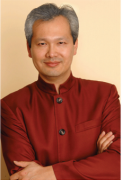May is Women’s Health month. Last week I had the honor of speaking on a panel of medical experts at the premiere of Breast Cancer: The Path of Wellness & Healing at Creative Artist Agency in Los Angeles. The film, which was produced by Nina Karp and Joyce Osten—a two-time breast cancer survivor--is an incredible resource for anyone either with the diagnosis or is concerned about the disease. It features interviews with many top medical experts including Drs. Susan Love, Dean Ornish, and Dennis Slamon as well as celebrity cancer survivors like Sheryl Crow, Olivia Newton-John, and Jaclyn Smith.
Despite billions of dollars spent on research that has resulted in advances in detection and treatment of breast cancer today one out of eight women will develop breast cancer compared to one out of 14 in 1960. It is likely that any woman you ask will know somebody who has or know someone else who has had breast cancer. Its prevalence begs the question: why hasn’t there been more focus and resources devoted to prevention of the disease in the first place? Unfortunately that just hasn’t been the priority. But it should be.
We have known from studies over the years that environmental factors contribute to many cases of cancers in general and in particular breast cancer. A majority of breast cancers in North America are due to excess hormones—estrogen in particular. There are over 10,000 registered chemicals that have estrogen-like effects, in addition to being toxic and carcinogenic. These environmental estrogens are called xenoestrogens. It is common sense that a dramatic reduction in exposure to xenoestrogens in our environment can correspondingly lower the risk of breast cancer.
Take the case of Bisphenol-A (BPA), a chemical used in molding plastics into shapes like a water bottle or baby bottle. For years scientists have known that BPA is an endocrine disruptor—an agent that causes hormonal imbalance that acts like estrogen in the body. However it took the EPA and the FDA until recently to ban it from use in baby bottles. Other known estrogenic substances include insecticides, pesticides, food preservatives like BHA (butylated hydroxyanisole), chlorines used in cleaning products, meats produced with hormones, just to name a few.
The importance of environmental toxins and cancer was highlighted by a report released last week by the President’s Panel on Cancer. Here is what the panel recommended to avoid exposure to toxic chemicals that may increase the risk of cancer:
• Choose foods, house and garden products, play spaces, toys, medicines and medical tests that will minimize childrens' exposure to toxins.
• Reduce exposure to occupational chemicals by removing shoes before entering the home and washing clothes separate from other family laundry.
• Filter home tap or well water to reduce exposure to known carcinogens and endocrine-disrupting chemicals. Use filtered tap water rather than commercial bottled water.
• Store and carry water in stainless steel, glass or BPA- and phthalate-free containers.
• Microwave food and beverages in ceramic or glass -- not plastic -- containers.
• Choose food grown without pesticides or chemical fertilizers and wash conventionally grown produce to remove residues.
• Eat meat produced without antibiotics and added growth hormones.
• Avoid or minimize consumption of processed, charred, and well-done meats.
• Wear a headset when using a cell phone and keep calls brief.
• Check home radon levels.
• Reduce or eliminate exposure to second-hand smoke.
• Discuss the need for tests or procedures that involve radiation exposure with your doctor.
• Create a record of all imaging or nuclear medicine tests received and if known, the estimated radiation dose for each test.
• Avoid overexposure to UV-rays by wearing protective clothing and sunscreens and avoiding the sun when it's most intense.
• Become an advocate by strongly supporting environmental cancer research and measures to remove toxins from the environment.
Besides minimizing exposure to environmental toxins, there are other factors that also increase and predispose one to breast cancer. These factors include the time of menstruation onset, stress, poor diet and medication use such as hormones and genetic history all of which we have some control over, even with genetic predisposition. The study of epigenetics is teaching us that all genes require triggers and that by modifying our lifestyle and even our thoughts we may be able to lessen the expression of cancer genes.
At Tao of Wellness we work with oncologists and breast cancer patients daily in integrative oncology. We use acupuncture, herbal and nutritional therapies to support patients undergoing surgery, chemotherapy and radiation in order to reduce side effects such as nausea, digestion distress and nerve damage and support patient’s vitality and immune functions. Just as important we counsel our patients about what they can do to lower the risks of recurrence including eliminating environmental toxins.
I hope that by taking control of one’s environmental health through the simple steps outlined above more women will avoid suffering unnecessarily from the tyranny of breast cancer. May you live long, live strong and live healthy!
Dr. Mao Shing Ni, also known as Dr. Mao, is a bestselling author, doctor of Oriental Medicine and board certified anti-aging expert. He practices acupuncture, nutrition and Chinese medicine with his associates at the Tao of Wellness in Santa Monica, a Wellness Medicine group that won the “L.A.’s Best” Award. Tao of Wellness was founded by Dr. Mao and his brother, Dr. Daoshing Ni over 25 years ago. In addition, he is the cofounder and Chancellor of Yo San University in Venice/Marina del Rey. To subscribe to a free newsletter please visit www.taoofwellness.com To make an appointment for evaluation and treatment please call 310-917-2200 or you can email Dr. Mao at [email protected]






Add a CommentComments
There are no comments yet. Be the first one and get the conversation started!